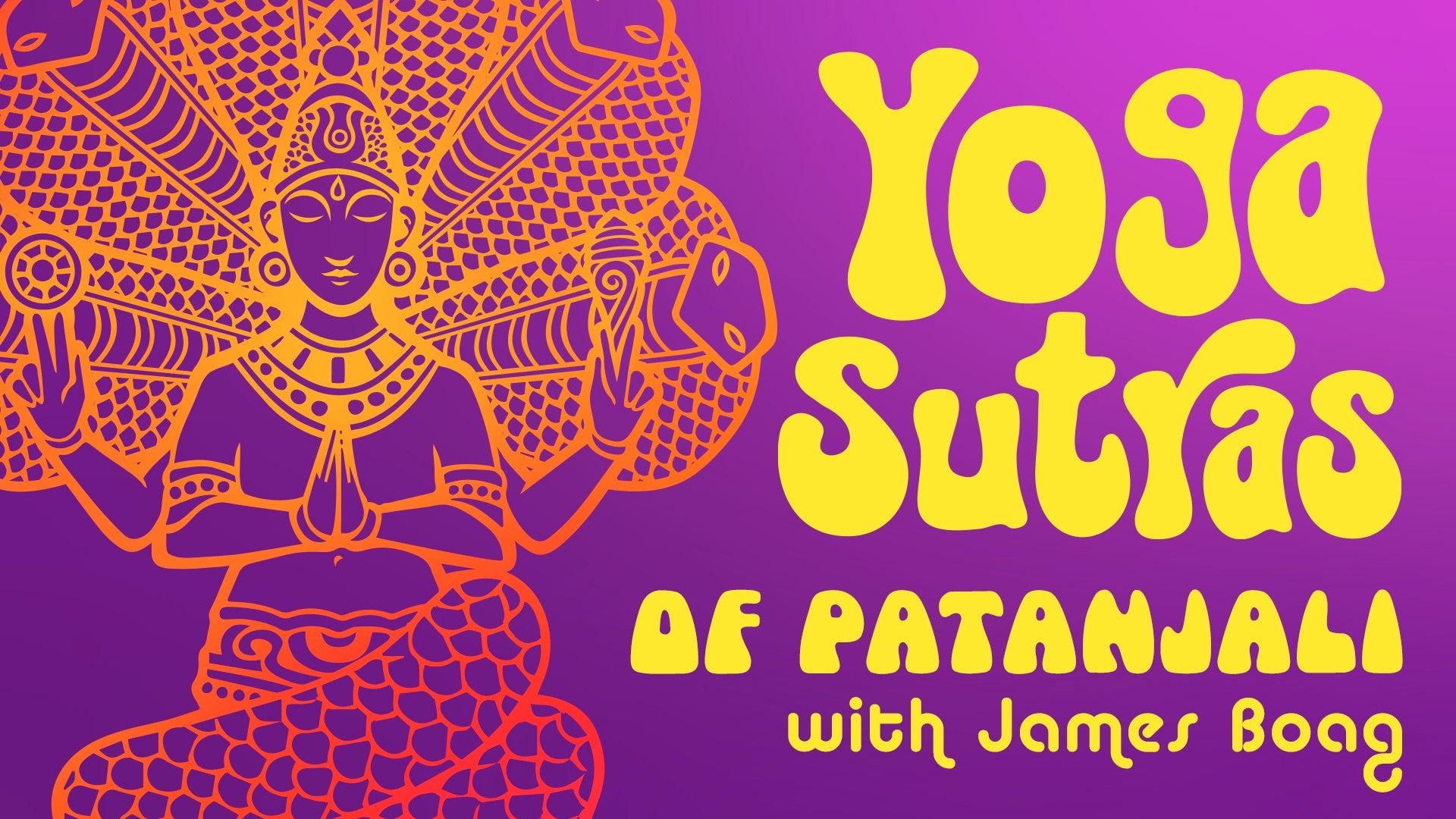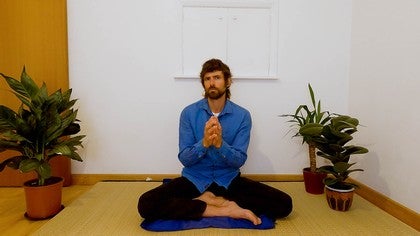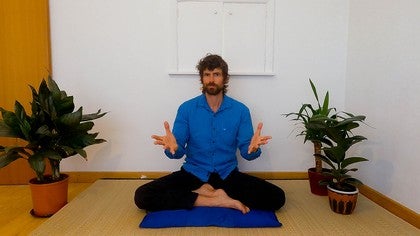Description
Sutra 2.34, vitarkah himsadayah krita karita anumoditah lobha krodha moha purvakah mridu madhya adhimatrah dukha ajnana ananta phala iti pratipaksha bhavanam, encourages us to swim against the current of our self-sabotaging habits and find new courses of action to help us find harmony in troubling situations.
Please find the article on Buddiyuktah that James references in this video here.
About This Video
Transcript
Read Full Transcript
Sutra 34 is, one of the longer sutras, especially in this chapter, and it is telling us about this practice are beginning to tell us more about this preps of Pratipaksha Baba, and I'm So ity It's a little bit like a speech mark in the Sanskrit. Itty Pratipaksha Marwanam. This is Pratipaksha provenas, and the previous sutra put on it just told us, when we find ourselves afflicted by thoughts that would pull us away from yamani yamma that would pull us away from the James or guidance or pilots of our conscience. And so steer us away from the cause of our deep belonging, what to do, how to resist those tendencies that would tyrannize us and pull us in the direction of greater suffering and self sabotage. What to do about it? How can we Resist. How can we stay on track more readily?
What resources do we have available? So Ity Pratipaksha Bavanam. This is Pratipaksha Bavanam. What does Paterka give us in this initial definition? He says.
So him means causing him, so the harm causing pain causing unnecessary suffering removable pain. Pain is to be avoided causing the thoughts, tendencies, urges. Well, how are they? How is pain, how is needless suffering. It can be, it can be, or it can be Krita means it can be done. These things, these these these tendencies, these thoughts, they can be things that we do.
Cardita, things that we cause to be done, or things that we allow permit to be done, or that when we see them being done, we we applaud. We validate them. We support them. So the action the thoughts and the potentially ensuing actions that cause suffering and needless pain, there are things that we can do ourselves that we can cause to be done or we can just allow it to be done. So what does this tell us? First of all, it's not that, oh, I'll get somebody else to do my dirty work, and then I'm not, you know, I'm clear of No. No. No. It's not like that. Wherever our conscience is involved, this is our responsibility.
And this takes us back to that primacy of conscience and inquiry. Things that I do myself, it's obviously very, obviously, up to me. Things that I cause or direct or pressure to be done. Obviously, my own involvement is perhaps easy to discern. But when it comes to allowing or permitting or condoning, then that line might be a little bit more challenging. Again, we come to the primacy of presence here and how Yamani Yama give us that useful lens of inquiry.
So the harm causing thoughts and potentially ensuing actions, they're things that we can do, caused to be done or just allow to be done. And how are they? LoRa, LoRa, LoRa, Excuse me, Kroda and Moha. In reverse order, Moha means confusion. Croda is anger, but anger in the broad sense of things that the thing that causes us to get tense, not just rage, but also some feeling of frustration, some feeling of tension that affects our judgment, our awareness to be clouded, and loba as a verbal root means it's when we strongly desire something, so it has a consternating stirring up perturbing effect. So it's the idea that the actions or the thoughts that caused this pain.
They are preceded by some type of desire that might be based on fear or wanting things to be different or craving something. And the ensuing anger and disturbance to our awareness and the ensuing confusion. Now in the description for this episode, this little section, there is a link to an article I wrote about being connected to our discernment, and it cites this very, very beautiful pair of verses from the second chapter of the bhagavad gita, which you can also watch here on yoga anytime. It's verses 6263 in which Krishna, I I sometimes say he outlines the whole course of human history and 64 syllables. He talks about when a human being focuses on something, we tend to get attached to that. We get attached to things.
We have certain desires. We want things to go a certain way. And when they don't, what happens, from karma and desire, or in this context, the word loba is fairly synonymous, from that loba or karma, then what happens Croda? Some type of anger, and we get angry what happens to our discernment, what happens to our vision, distortion, clouds, shrouds, valings. And in those verses in the Gita Krishna says, what happens when a person becomes angry?
Then it's like our awareness gets shrouded, and it's like we forget the lessons that we have learned. We lose connection with our discernment discriminating awareness, and then it's like we're thoroughly lost. So what does this tell us? It's like this acting in ways that perpetuate needless pain, there are warning signs. This takes us back to chapter 1, when potentially to spoke about when those things that get in the way of yoga, the obstacles to yoga come up they do not come up without attendance There is there is some disease There is our mental outlook is also affected. Our limbs, our steadiness is not is not so steady.
Our breath is affected. Our energy is affected. There are these warning signs here too, Britannia is very clear. Notice what is the root of this type of attitude, this type of behavior, this inclination, this type of mental pattern that is causing suffering. Is there some type of disturbing desire or fear or wanting things to be different or lack of accept in the reality and trying to run away from it.
Is there some, anger or frustration is there some resulting confusion perturbation? So whenever I notice the time under the sway of anger and of fear and perturbation, but sometimes he's telling us, be alert I'm more likely to take self sabotaging steps when I'm under the influence of those types of phenomena. So harmful things can be done, cost to be done allowed to be done. They proceeded by desire, anger, and confusion. They can be mild, madam, medium, or intense.
They can be intense. They can be full and they can be they can be extreme. They can be medium. Or they can be apparently trifling, apparently trifling. And I would say this is really key because it's not that they are trifling.
Because as many teachers have pointed out over the millennia, to a certain degree, how we do anything is how we do everything. So these trifling things, they are habit forming. If I discount my conscience when it seems like it's not a big deal, this could become a very big deal very quickly because that negation or suppression or denial of conscience sets in motion a pattern of not listening to my own conscience. We're just gonna make it harder to then heated and really discern its input, its guidance in those more extreme challenging situations. So they can be apparently trifling.
They can be medium or they can be really big things, but still they can cause that Hinsa. They can cause that disturbance. They can cause that harm. What is their fruit? What is the outcome? Of these, these pain causing thoughts, tendencies actions.
Means disease, pain, suffering, again, Yana knowing, Yana not knowing, confusion. If I act on these types of troubling thoughts. What is the consequence? It's like it sets in motion as cascading spiraling exacerbation of my own entrapment bondage and measurement. It veils me further.
It's like appetite grows by what it feeds on. If I cultivate habits of dining on a very poor diet, I'm gonna get used to that, and that's gonna clog and fog my system. So this is Pratibaksha Barena, very also kind of summarizing the pain causing thoughts, the pain causing actions, their things we can do cause to be done allowed to be done. They're preceded by desire, anger, and confusion. They can be mild, medium, or extreme. Their fruit is endless pain and confusion and exacerbation of Avidya, not seeing clearly.
This is Pratipaksha Barvinham. So this is already one layer of the instruct to remind ourselves of how we can be more than implicit, we can be the cause of our own ongoing suffering. So Let's remind ourselves a little bit more what we need to remind ourselves of in order to avoid going into those self harming patterns. You mentioned already the idea of how the seemingly trifling might not actually be so trifling. And this is why One of the reasons why I think of yoga as the rehabilitation or the recovery project, I think pretty much everyone has experiences as a child when the grown ups, the adults, the people who are in positions of responsibility relative to us may sometimes act in ways that have a consequence of us overriding our conscience.
For example, sometimes a young child may feel very hungry, and the parents say, no, no, it's not time to eat now. And over time, this can exacerbate a disconnect between the body's own intelligence and how we act. Similarly, the child might be bursting for the toilet, but the teacher's, no, no, wait till the end of the lesson, for example. So all of this innate wisdom and intelligence of the bodily system, it can be kind of a little bit overridden or suppressed by societal forces. And so can we set in motion a pattern or a habit of ignoring and ignoring our conscience or privileging conformity with social mores or social conventions instead of heeding the voice of conscience. And this can be especially dramatic especially the case in societies which emphasize fitting in.
And conformity and obedience and good, Boag and girls behave in a certain way. So Pratipaksha Barvina, one way we can think of it, Pratipaksha, the other way. So one directive that I would take from this is get used to swimming against the current. Get used to swing against the current of our habits because if we're gonna extricate ourselves from our own bondage and from our own limiting patterns, then we'll have to, at some stage, maybe many stages, as I've said plenty of times before, looking at ways that reach beyond our habitual ways of looking, we have to look at perspectives that would challenge us to change our habits. So we really need to practice being alert Sometimes people say life is an ocean, and sometimes people describe the whole spiritual journey as crossing the ocean of some tsar of transmigratory world, the existence. Now, on the ocean, there are so many current and there's so much weather, and the weather changes, and the currents change.
So in order to stay on course, We need to be alert. We need to be attentive. And Yamani Yama, our mechanisms, our frames of reference, our lenses, supports that can really help us cultivate that steady attentiveness. That is a prerequisite of the actual practice of Pratipaksha Bavanah. So one way we can now also cultivate Pratipaksha Bavanah in our day to day life is anytime we find ourselves, for example, triggered or challenged by a viewpoint to practice. What is valid about that viewpoint that I would ordinarily dismiss can I make a discipline of really considering the other point of view? Can I walk 2 moons in that other person's perspective?
And then can I also look another perspective that is more than a counter to what I would initially think or do? Can I see a third, a 4th perspective? Can I look at this in a new way? So that curiosity and lens of inquiry also fortifies the tools of our awareness to be a little bit more adaptable and responsive when we need to pull ourselves out of a negative pattern. So sometimes people describe predi baksha barvin.
It's like, Well, if you're feeling a certain if you're feeling x, then practice the opposite. But Let's say, for example, you're feeling enraged. You're so angry. And somebody says, oh, well, practice loving kindness. Is it ease that's not very easy to do, or if you're really down and dejected and just feeling swallowed up in grief for the world, Then dancing a jig of joy, it doesn't really it's not very easy to do that.
I don't think this is really what pretty buckshipping a means. I think what it means is as a ongoing constant practice, remind ourselves of different perspectives so that when I feel myself getting trapped in anger or rejection or grief, however, or I feel myself getting resentful and so perhaps justifying some self sabotaging or harmful to others action, I can call myself out because I've made a steady regular practice of calling myself out of examining my tendencies. And this is where Yamani Yama and Pratipaksha Bhavanah go hand in hand. As we're gonna see, this is elaborated much more as potentially continues. It's not that this Sutra 34 is its own practice.
It is, but it's much more than that. This is part of the practice of Yamani Yama. This is part of the Ashtanga. And as we mentioned already, it's not one or the other. I like this Yama. I like that anger.
I'll do this one and that one. No. No. No. They all support each other. So Pratibaksha Bhavanah is very much part of the cultivation of the James and the Niyamas. And as part of the cultivation of the James and the Niyamas, now Yamah, we had it already. This is the vow to be always observed.
Now this very interesting comment from Viasa in his commentary here, and he says that once a person who is interested in yoga, has started cultivating Yamani Yamma, What he says many interesting things. One thing is is that when we do this, in a sense, it keeps us out of mischief. This is also cultivating the opposite way. It's like as we practice Yamani Yama, we habituate ourselves to the benefits of cultivating harmony. And once we get attuned to an accustomed to harmony, then it's easier to remind ourselves that, wait a minute. No. No.
I don't want to go and rob the bank or, you know, cheat on my friend or whatever. I don't want to cave into that slothful or greedy tendency or resentful tendency or whatever it might be. Because I'm much better off when I do that patient's steady work of cultivating the center in the harmonious way, So the more we practice yama and yama, the more we've got like a barometer and a reference, it's worth making that effort. But Viasat, the thing I was starting to say the interesting thing he says, he says once we've started that, if we then go back to the obsolete habits that are that cause unnecessary harm Vyasa says, then we are like a dog who licks up its own vomit. Quite a powerful image. Yeah.
We don't wanna be like that, do we? If we have a diet of excreta, what type of mutant will we become? It's not gonna be good for us, but it's very interesting that Vyas's comment. I don't know if the the man of letters and playwright Samuel Beckett was a student of yoga and potentially in Vyasa. But there is a quote of Beckett's that my friend mentioned to me quite recently. I said, that's straight out of the Boag sutra commentary from my co you know, that's thousands of people have been sending this for 1000 years, he said. Let me get it correct.
Habit is the ballast that chains the dog to its own vomit. And Beckett said that in the 20th century. Habit is the ballast that changed the dog to its own vomit. And this is what Potentially is talking about. This is the means to come out of the already established patterns of self sabotage, the diligent practice of Pratipaksha Bavanah, Now that image of eating up our own vomit, of course, we don't wanna do that.
But sometimes we do that without even realizing it, and this is the area of the importance of the trifling things. Why how we do small things counts because corruption it can start just a small thing, but then it kind of breeds a culture of corruption. Not listening to conscience, not listening to reason, overriding satya, truth, and authenticity, can become normalized, and then we can be in a very, very toxic situation, a situation which is gonna be more and more difficult to extricate ourselves from. And so the idea in yoga in the Sanskrit tradition, they say satyam Avagiati. Truth alone, ultimately will emerge victorious.
If we compromise on our conscience, if we allow ourselves to tell lies for the sake of convenience or to conform to somebody else's idea of what is appropriate. If we do contravene our conscience, we're just gonna get more and more embroiled in the pain that has to be removed. We are postponing the work and making it harder Sometimes it will mean mustering tremendous valor swimming against the current, resisting the mainstream sometimes resisting the tendencies to prevalent around us. Remember, Potentially said, this is the great vow irrespective of the trends or fashions or dominant things that are influencing the zeitgeist. There is a part of each of us that is timeless, and it's very striking Yemeniyama. Sometimes people say, oh, it's a bit like the 10 commandments. Yes, it is.
Pretty much all spirit traditions. They all say, yeah, avoid do no harm. Cultivate harmony. Be a good neighbor. Leave the world better than you found it.
Don't lie. Be honest, be respectful. It's not an accident. These are the principles that actually uphold cosmic law, I would suggest. That's what it feels like to me.
There are certain things that are very cultural, but there are certain underlying principles of actually cultivating harmony actually making an effort to be respectful to oneself, to all other beings that we find at the core of all the spiritual traditions that have been around and survived for 1000 years. Certainly, there may be certain dogmas that people are not so keen on anymore. We come back to the core principles of most spiritual traditions, even when they have been formed into religious schools or presentations, the very core teachings that we find in all of them I don't think we find them recurring all over the place incidentally or accidentally. The riches, the seers of the yoga tradition, they recognized this is very proveable. There's nothing in the yoga sutra that you have to believe. Put it to the test.
I found that what my Indian teacher said, betray your conscience and you're damned. It's true. Anytime I've contravened my conscience, it's not worked out well. Sometimes, healing my conscience means taking a stand that involves some pain that involves some discomfort. But the payoff is that if I die today, I can die in much greater peace And if I'd known I had gone against my conscience and heeding my conscience, I can prepare to die in peace by making myself, by making it easy to sleep in peace a little bit more easily at the end of every day.
So Pratipaksha Babana, one thing that's very nice here, Potanjali is very practical. He's saying your troubles will arise. We will find ourselves being pulled in different directions. That's normal, knowing to berate ourselves. Apply the just remedy. And, again, we have prescription and description.
We get the description of the problem, and it encodes a prescription. Remind ourselves of the consequences of one type of course of action, and practice a different course of action. That can then build its own protective momentum to help us stay more attuned to concussions and more on the course of actualizing those deeper authentic longings.
Yoga Sutras of Patanjali: Yamas and Niyamas
Comments

You need to be a subscriber to post a comment.
Please Log In or Create an Account to start your free trial.








